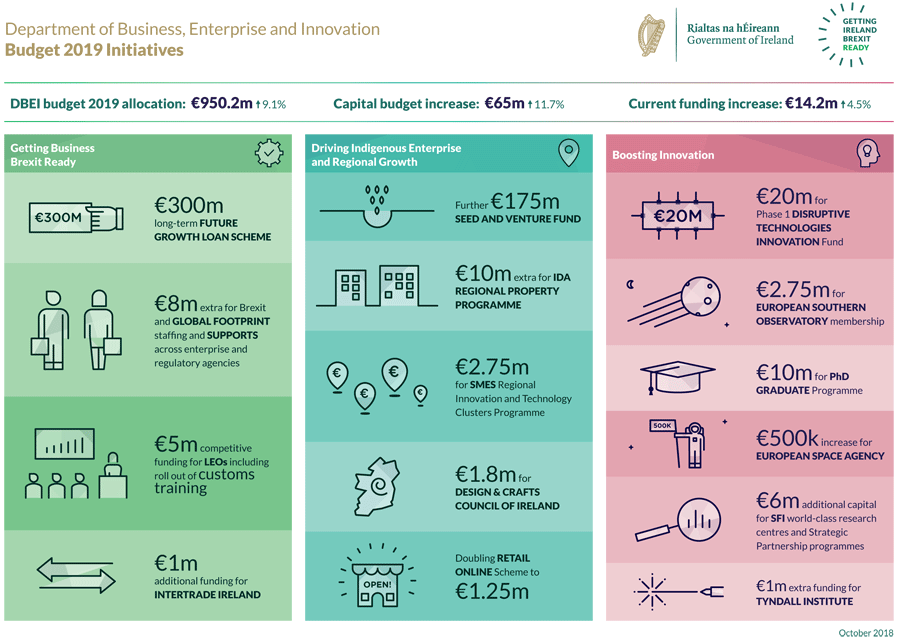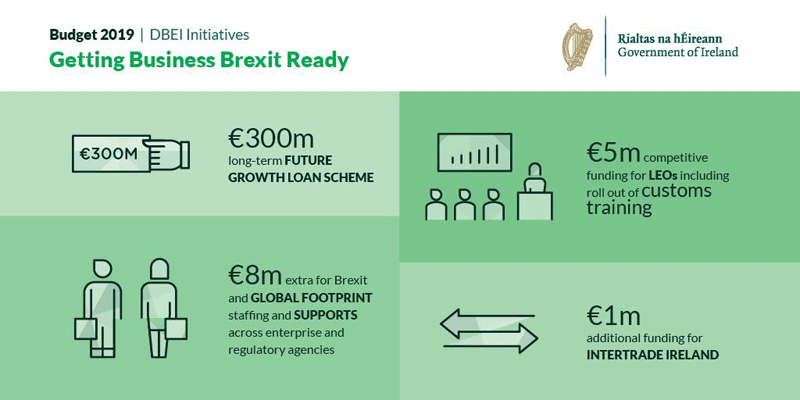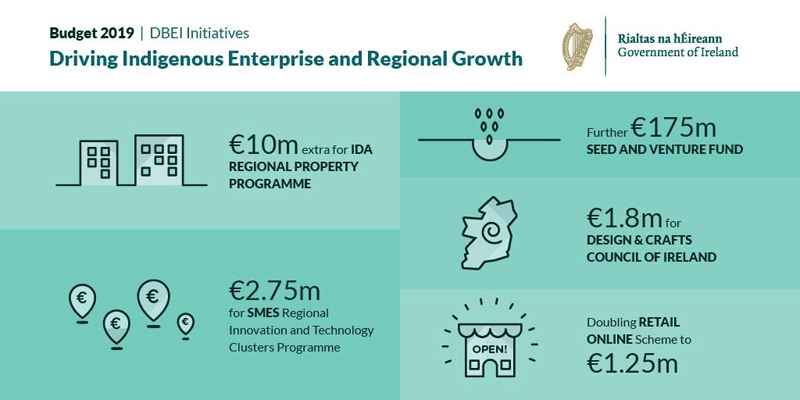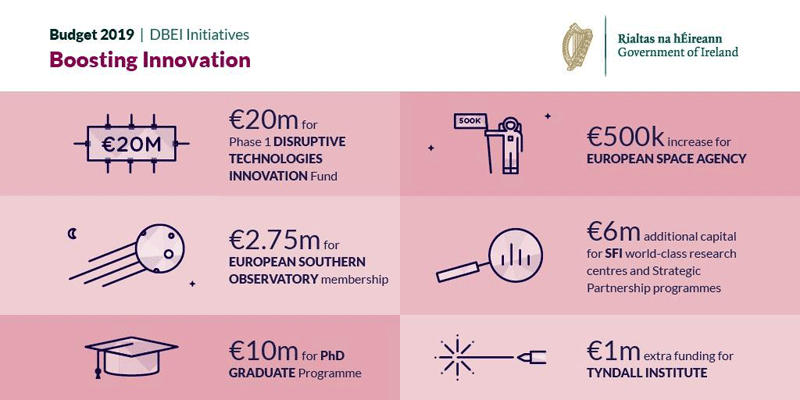9th October 2018

Department of Business, Enterprise and Innovation Budget 2019 Initiatives:
• Getting Business Brexit Ready: €300m long-term Future Growth Loan Scheme; €8m extra for Brexit staffing & supports across enterprise and regulatory agencies; Roll out of customs training through Local Enterprise Offices and Enterprise Ireland; €1m additional funding for InterTrade Ireland.
• Driving Indigenous Enterprise and Regional Growth: A new round of €175m for Seed and Venture Capital Fund; €5m Competitive Funding for Local Enterprise Offices; €10m extra for IDA Regional Property Programme; €2.75m for SMEs Regional Innovation and Technology Clusters Programme; €1.8m for Design Craft Council of Ireland; Doubling Retail Online Pilot Scheme to €1.25m.
• Boosting Innovation: €20m for Phase 1 of Disruptive Technologies Innovation Fund; €2.75m additional for European Southern Observatory membership; €10m additional for PhD/Research Masters Programme; €0.5m additional for European Space Agency; €5m additional capital for six SFI world-class research centres, €1m additional capital for SFI’s Strategic Partnership Programme; €1m extra funding for Tyndall Institute.
This allocation is €79.2m above the 2018 allocation of €871m for the Department and includes a record Capital budget increase of €65m (+11.7%) on the existing ceiling of €555m and an additional €14.2m (+4.5%) in Current funding.
Minister Humphreys said:
“My Department is currently developing a new cross-Government strategy for the next phase of Ireland’s economic development, the Future Jobs Initiative, together with the Department of the Taoiseach. The Programme, which focuses on quality jobs, improving productivity and building resilience in our changing world, was foremost in my mind when allocating funding within my Department for 2019.”
“In prioritising three key areas of Brexit, regional growth and innovation, I am confident that our business community will be best placed to meet the opportunities and challenges ahead.”
Getting Business Brexit Ready
€300m Future Growth Loan Scheme
Speaking about the Department of Business, Enterprise and Innovation’s Budget 2019 allocation Minister Humphreys said, “the Government has laid a solid foundation for businesses, allowing for jobs and growth to flourish while safeguarding against global challenges including Brexit”.
“Budget 2019 recognises that, within the next six months, Ireland’s trading relationship with the UK will change. Brexit brings much uncertainty, but what we do know is that we need a combination of short, medium and longer-term strategies to best prepare for the challenges ahead.
“Earlier this year, I launched the working capital €300m Brexit Loan Scheme with Ministers Creed and Donohoe to provide affordable financing to Irish businesses that are either currently impacted by Brexit or will be in the future. We are now announcing a longer term €300m Future Growth Loan Scheme for loans of up to 10 years”, she added.
The Scheme has been developed by the Department of Business, Enterprise and Innovation with the European Investment Bank Group, the Department of Agriculture, Food and the Marine, and the Department of Finance together with the Strategic Banking Corporation of Ireland (SBCI).”
Minister Humphreys said “this Scheme is crucial as it will provide businesses the opportunity to borrow for up to ten years to support capital investment. It addresses the lack of availability of loans in the marketplace for loan-terms of longer than five-to-seven years”.
€8m extra for DBEI’s Brexit Response and Global Footprint
The Budget 2019 allocation also provides €8m extra for DBEI’s Brexit Response and Global Footprint. Minister Humphreys said “my Department and its enterprise agencies will play a significant role in enhancing Ireland’s presence overseas. To support that, I am allocating €3m in additional resources to Enterprise Ireland and €2m to IDA Ireland.” Additional funding will also be provided to the Department, its regulatory offices and agencies, including the National Standards Authority of Ireland, the Health and Safety Authority and the Competition and Consumer Protection Commission to support businesses in meeting the challenge of Brexit.
InterTrade Ireland
Minister Humphreys also announced an extra €1m in capital funding for InterTrade Ireland (ITI), an increase of 17.5%. “ITI has a major role to play as part of Ireland’s Brexit response and is facing increased demand for their services particularly from companies in the Border region. This additional funding will enable the body to meet demand in existing programmes, develop initiatives and support firms affected by Brexit”, she added.
Local Enterprise Offices
In addition, Minister Humphreys allocated an extra €5m to the 31 Local Enterprise Offices (LEOs), up 22% on 2018, which have a presence in every county, to support start-ups and growth and in particular to support businesses to prepare for Brexit. Welcoming the increased funding, Minister Breen said “the LEOs will work with the broad range of indigenous enterprises across sectors to ensure that they are informed and have plans in place to manage the new trading relationships on the island and with the UK more generally. This will include a new customs training programme for all businesses, exporters and importers, to be rolled out in conjunction with Enterprise Ireland”.
Driving Indigenous Enterprise and Regional Growth
The Department is also announcing a range of measures in Budget 2019 to further drive indigenous enterprise and regional growth, in line with the objectives of the Regional Action Plans. Minister Humphreys said the €10m extra for IDA’s Regional Property Programme is crucial for regional enterprise development and job creation.
“This extra funding is critical to winning investments into regional locations. In 2015 the Government unveiled a five-year IDA Plan aimed at accelerating the jobs recovery in every part of the country.
Project Ireland 2040 names the Border and Midlands regions as priority areas for the Programme, and so the funding will be used to start building advanced facilities in Dundalk, Monaghan, Sligo and Athlone, as well as Limerick, Waterford and Galway where the IDA has also identified a need”, she added.
€2.75m will also be allocated to Enterprise Ireland to fund a support programme of Regional Innovation and Technology Clusters. Minister Breen said “building enterprise capability in the regions is a key driver of productivity growth and resilience. With this support Enterprise Ireland will progress a number of regionally focused initiatives linking SMEs and Institutes of Technology, and deliver new Project Ireland 2040 commitments to build regional sectoral clusters to scale and internationalise enterprise in all regions.”
Given the importance of SMEs to our economy, Minister Humphreys welcomed the measures announced by Minister Donohoe which will enhance a number of the taxation supports specifically targeted at our businesses. “The redesign of the Employment Investment Incentive Scheme (EIIS) and enhancements to the Key Employee Engagement Programme (KEEP) share option scheme show the level of commitment from this Government to indigenous enterprise”, the Minister added.
“I fully support these measures which will assist our SMEs by providing them with the tools and incentives to grow their businesses in Ireland. Such measures allow our SMEs to attract and retain talented individuals and encourage investment in their ideas in order for the businesses to scale and internationalise.”
“The extension of the Section 481 Relief for the Film Sector and in particular the uplift for productions being made in the regions is also very welcome and will further enhance Ireland’s reputation as a location for major film and TV productions”, the Minister added.
Boosting Innovation
Minister Humphreys also commented on the €20m allocated in funding for Phase 1 of the Disruptive Technologies Innovation Fund (DTIF), a key element of Project 2040. “This call for the Disruptive Technologies Innovation Fund will see investment in the development and deployment of disruptive innovative technologies and applications, on a commercial basis, targeted at tackling national and global challenges.”
Minister Halligan welcomed the €5m additional capital to support the next phase of work for the initial six Science Foundation Ireland world-class research centres. “This additional funding for SFI’s research centres, along with an additional €1m for SFI’s Strategic Partnership programmes, the €2.75m additional funding for Ireland’s membership of the European Southern Observatory, €500k additional monies for the European Space Agency, and €1m in funding to the Tyndall National Institute will help position Ireland as a global innovation leader of the future.”
“In addition, I very much welcome the €10m allocated to the ongoing roll out of the new PhD Graduate Programme. This is an essential element of meeting the demands of industry for high-skilled workers, and will address a key action of Innovation 2020 to increase the enrolment and output of postgraduate researchers”, he added.
As part of Budget 2019, the Department also allocated an initial €1m to establish the Office of the Director of Corporate Enforcement as a statutory agency. This delivers on the Government’s commitment to tackling white collar crime. In addition, a further €1m is being allocated to the Workplace Relations Commission (WRC) to provide for the extension of its remit in 2019 to cover the Garda Síochána and the Civil Service.
ENDS
For further information, please contact Press Office, Department of Business, Enterprise and Innovation 01 631 2200 or press.office@dbei.gov.ie
Note to Editor
Please see further information on the Department of Business, Enterprise and Innovation’s key Budget 2019 initiatives below.
Getting Business Brexit Ready
€300m long-term Future Growth Loan Scheme
The €300m long-term Future Growth Loan Scheme has been developed with the European Investment Bank Group, the Department of Finance and the Department of Agriculture, Food and the Marine, together with the Strategic Banking Corporation of Ireland (SBCI).
The Scheme will provide up to €300m to support eligible businesses to strategically invest in a post Brexit environment, which in turn will fuel future economic growth in our important indigenous sectors by helping them remain competitive. It will bring much needed long-term lending to the marketplace by offering loans terms of 8 to 10 years. It will be competitively priced, with better terms and conditions than are available in the marketplace. The scheme will be delivered by the Strategic Banking Corporation of Ireland through participating finance providers.
The new Future Growth Loan Scheme represents a significant addition to the suite of existing finance supports which have been developed to specifically meet the identified needs of businesses, particularly those SMEs and Microenterprises who are impacted by Brexit, including the Revised Credit Guarantee Scheme, Microfinance Ireland (MFI), the Enterprise Ireland Seed and Venture Capital (“SVC”) Scheme and the short-term Brexit Loan Scheme.
€8m extra for Brexit staffing & supports
The challenge of Brexit continues to place significant demands on the Department of Business, Enterprise and Innovation, its Regulatory Bodies and our Enterprise Agencies. The Department is to the forefront of the work ongoing across Government to make Ireland Brexit ready. The Enterprise Agencies have a need for a greater presence in global markets given the importance of businesses diversifying their market presence in the light of the UK’s exit from the EU. The additional funding will enable the Department and its Regulatory Bodies to further increase their staffing resources as well as fund related promotional and regulatory activities.
€1m InterTrade Ireland Brexit Response
InterTrade Ireland is at the forefront of Ireland’s Brexit response and are facing huge demand for their services and programmes. Many of the companies seeking the assistance of ITI are located in the Border region. This additional funding will enable ITI to meet demand in existing programmes; develop initiatives and support this cohort of firms.
Driving Indigenous Enterprise and Regional Growth
A new round of €175m for Seed and Venture Capital Fund
Seed and Venture Capital (VC) concerns equity investments made by professional investors, typically in early stage, fast growing and high potential private companies. By their nature these businesses have the potential to make a disproportionately large contribution to economic output and employment and so this is an important strategic instrument for enterprise policy. The benefit of seed and venture capital derives not just from the financing support but also from valuable soft supports such as managerial expertise and access to networks.
Following an extensive evaluation of Enterprise Ireland’s Seed & Venture Capital Scheme, a new programme of funding for the Scheme of €175m is to begin. The new Programme will be in place next year and will cover the period to 2024. The Programme will be oriented towards seed and early stage investments, where the evaluation has shown there is a very clear market failure. It will actively direct investment to key sectors that have been identified for development as part of overall enterprise strategy and will be closely aligned with other key enterprise support programmes.
The fund is expected to leverage a further €525m in private sector funding to make available a total of €700m. Well over 100 innovative Irish companies are expected to benefit, with thousands of jobs created and hundreds of millions of euros in additional exports generated.
€5m Competitive Funding for Local Enterprise Offices
The additional funding will allow the Local Enterprise Offices (LEOs) to build upon their specific strengths in furthering enterprise development and job creation in their local areas. The €5m will be available through competitive funding so as to maximise its potential in supporting high quality proposals for regional job creation. The funding will also enable the LEOs to roll out a customs training programme for exporters and importers in conjunction with Enterprise Ireland.
€10m extra for IDA Regional Property Programme
The advance availability of suitable office and manufacturing buildings is critical to winning investments into regional locations. In 2015 the Government unveiled a five-year IDA Plan aimed at accelerating the jobs recovery in every part of the country. The Plan included the delivery of a €150m IDA property investment programme to attract foreign direct investment into different parts of Ireland over a five-year period. New funding for IDA property investment is being provided for facilities in Dundalk, Sligo, Monaghan, Athlone, Galway, Waterford and Limerick.
Taxation measures for SMEs
Employment Investment Incentive Scheme (EIIS)
Following on from a review of the EIIS, the decision was taken to redesign some critical elements of the scheme to improve its efficiency.
Key Employee Engagement Programme (KEEP) Share Option Scheme
When first introduced in Budget 2018, the scheme restricted the value of options which may be awarded to an employee to 50% of salary. The amendment in Budget 2019 sees this increase to 100% of salary. Another amendment sees the maximum value of qualifying options which may be awarded under KEEP revised from €250K in a 3-year period to a lifetime total valuation of €300K.
€2.75m for SMEs Regional Innovation and Technology Clusters Programme
Building enterprise capability in the regions throughout Ireland as a key driver of productivity growth and resilience, underpins the delivery of Enterprise Ireland’s strategic ambition. To support the broader base of SMEs in the regions and Government regional policy, the agency will progress a number of regionally focused initiatives with the Institutes of Technology and deliver new Project Ireland 2040 commitments, such as a programme of Regional Innovation and Technology Clusters to support regions across Ireland to build enterprise capability.
€1.8m for Design Craft Council of Ireland
The €1.8m investment for the Design Craft Council of Ireland (DCCOI) is intended to expand marketing and development programmes, which are currently being delivered on a smaller scale by the Council for Irish designers and makers. Funding will support enterprises to exhibit at international trade fairs, to develop partnerships with flagship retailers, and to develop e-commerce capacity. The additional funding will assist the sector to develop and generate additional export sales and online revenue opportunities, increasing market diversification by client companies and underpinning sustainable growth. This is of particular relevance at a time when companies are facing risk from Brexit, arising from both access to the UK market and the potential loss of craft sales to UK tourists.
Doubling Retail Online Pilot Scheme to €1.25m
A €1.25m scheme to support the digital online capability of the retail sector in Ireland is being rolled-out, to be delivered via two competitive calls. This new initiative is aimed at supporting Project Ireland 2040 commitments to increase the scale and internationalisation of indigenous enterprise, increase productivity in high-employment domestic sectors and drive Brexit Business Transformation through firm-level supports.
Boosting Innovation
€20m for Phase 1 of Disruptive Technologies Innovation Fund
The €500m Disruptive Technologies Innovation Fund is being implemented through the Department of Business, Enterprise and Innovation, and its agencies, working with other research funding bodies to develop Ireland’s innovation ecosystem and responsiveness. The fund will see investment in the development and deployment of disruptive innovative technologies and applications, on a commercial basis, targeted at tackling national and global challenges.
A capital funding allocation of €180m is being made available to the end of 2022. The first €20m call under the fund was launched in June with a view to announcing the successful projects in December 2018.
€10m additional funding for Science Foundation Ireland’s new Centres for Researcher Training
2019 provides an additional €10m of dedicated funding for PhD/Research Masters enrolment through new Centres for Researcher Training (CRTs) by Science Foundation Ireland (SFI). This is additional to €5m provided to SFI in 2018 to commence dedicated funding of PhDs and research masters enrolment. The new SFI programme is a direct response to the action in Innovation 2020 to increase PhD and research masters output in areas aligned to enterprise needs. The CRTs will involve funding of over €100 million for 4 cohorts of PhDs and Research Masters.
€2.75m additional for European Southern Observatory membership
The European Space Observatory (ESO) is an intergovernmental science and technology organisation focused on astronomy. It carries out an ambitious programme focused on the design, construction and operation of powerful ground-based observing facilities for astronomy, enabling important scientific discoveries. The benefits of membership are significant and include the creation of advanced enterprise relevant skills in areas such as data analytics, software and photonics. Membership will also ensure Irish companies can compete for ESO contracts to develop innovative products and services. Ireland took up membership of ESO on the signing of the accession agreement earlier this month. The additional funding being provided in Budget 2019 will allow for the full year cost of membership to be met next year.
€0.5m additional for European Space Agency
Ireland’s membership to the European Space Agency (ESA) has facilitated a considerable expansion of the Irish space sector during the last five years. Project Ireland 2040 provides for further expansion of this engagement through a new Space Technologies Programme. This Programme will support an increased number of Irish companies to work with ESA in developing sustainable space technologies that can then be commercialised and spun-out into exporting sectors of the economy. The additional €500k being provided in Budget 2019 will bring Ireland’s contribution to ESA to €18.3m next year.
€5m additional capital for six Science Foundation Ireland (SFI) world-class research centres
SFI’s world class Research Centres have generated over 600 research contracts between academic researchers and MNCs and SMEs, with over €150m of committed industry co-funding and over €170m of competitively-won EU Horizon 2020 funding. The additional €5m being provided in 2019 will provide for renewal of funding for a number of centres that have reached the end of their first six years of funding and reflects the excellence of their research and their strategic relevance to Ireland.
€1m additional capital for Science Foundation Ireland (SFI) Strategic Partnership Programme
An additional €1m is being allocated for funding for SFI’s Strategic Partnership Programme which will provide funding for partnerships with industry and other partners on a 50:50 basis. The Strategic Partnership Programme is specifically aimed at funding compelling research opportunities, on a flexible basis, particularly in areas outside of the research centres.
€1m additional for Tyndall National Institute
In the context of the Project Ireland 2040, the expansion of Tyndall National Institute is identified as a priority project for Government. Tyndall National Institute currently leverages its 2018 DBEI core funding of €4.5m to achieve a total income of close to €40m. The aim is to grow Tyndall so that it is positioned as an international leader of scale in translational research, playing a key role in the further development of ICT innovation in Ireland.
The Department of Business, Enterprise and Innovation (DBEI) plays a key role in implementing the Government’s policies of stimulating the productive capacity of the economy and creating an environment which supports job creation and maintenance. The Department also has a remit to promote fair competition in the marketplace, protect consumers and safeguard workers.
Back to Department News